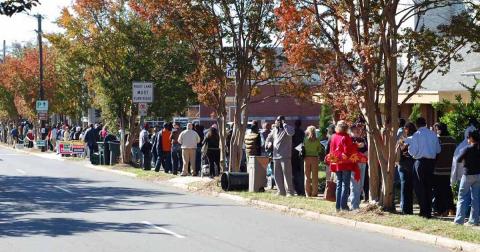Editor's Note: This article originally published on The Fulcrum and has been republished on IVN with permission from the publisher.
More than halfway into the year, and with most state legislative sessions concluded, the full scope of voting changes spurred by the 2020 election is coming into view.
As of last week, 18 states have enacted 30 laws that limit voting access, according to the Brennan Center for Justice, a liberal public policy institute at New York University Law School that has been tracking state voting legislation. At the same time, 25 states have signed into law 54 measures that expand access to the ballot box.
And more voting changes are sure to come. Thirteen state legislatures are still in session, and additional states, like Texas, may convene for special sessions.
Since the start of the year, more than 400 bills tightening voting rules have been introduced across nearly every state. This wave of restrictions is "the most aggressive" the Brennan Center has seen in more than a decade of tracking such laws. And the proposed changes are in large part motivated by false claims of voter fraud in last year's election.
Arkansas and Montana, with four new laws each, are tied for enacting the most voting restrictions this year. Arizona is a close second with three new laws.
Most of the restrictive voting measures approved this year focus on rolling back mail voting access by limiting the availability of drop boxes, shortening the time voters have to apply for an absentee ballot and limiting who can return another voter's mailed ballot. Other laws impose new identification requirements and increase maintenance of voter rolls, which could lead to the unintended removal of eligible voters.
In half the states where voting easements have been approved, those laws have mostly been focused on expanding access to early in-person and mail voting, as well as voter registration. A handful of states have also taken steps to restore voting rights to people with past felony convictions.
"Many of the states in which voting is already comparatively more accessible are the same as those enacting policies to further strengthen voting access, deepening a national divide such that the promise of the right to vote depends increasingly on where Americans happen to live," the Brennan Center wrote in its report.
Once again, the good-government organization urged Congress to take action to mitigate these voting restrictions by passing the For the People Act and the John Lewis Voting Rights Advancement Act. Since House Democrats passed the For the People Act in March, the sweeping democracy reform legislation has been stuck in the evenly split Senate with no clear path forward. The VRAA has yet to be introduced in this Congress.
